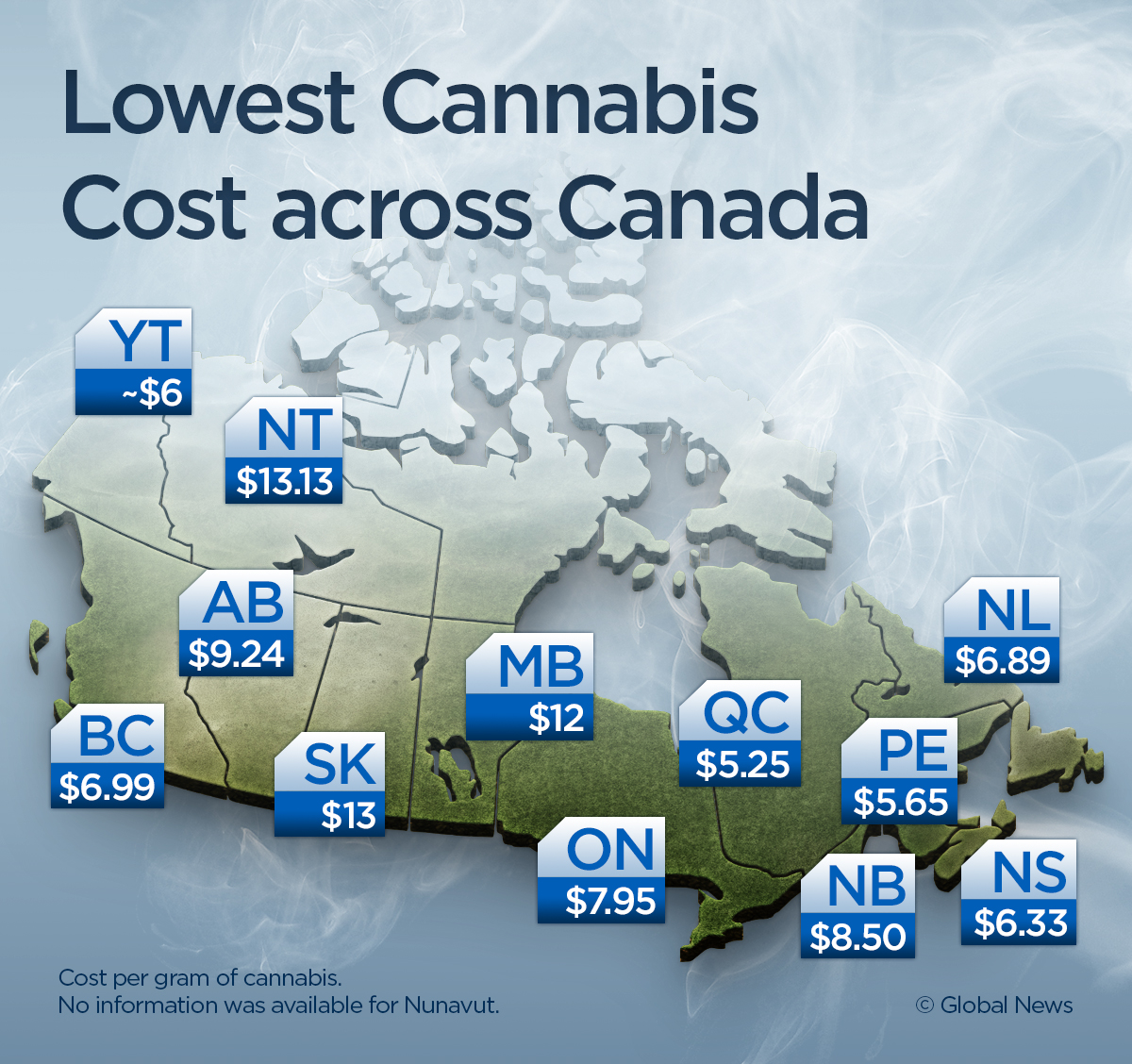As cannabis is legalized across the country on Oct. 17, Global News is answering key questions on what it means for you: What will the rollout look like in each province? What’s the impact on the economy? On your health?

To keep up to date on the legal, social and health implications of legalization, sign-up for our weekly newsletter, Cannabis IQ.
Recreational marijuana is now legal across the country, and that means an entirely new industry has taken shape within the Canadian economy.
Experts have long predicted that pot will be big business, with a base retail market value for recreational marijuana that could total between $4.9 and $8.7 billion a year. Statistics Canada expects that spending on legal cannabis in the last quarter of this year alone may range from $816 million and $1 billion. But there may also be some growing pains as consumers, companies and governments find their footing.
MORE: For the launch of our weekly newsletter Cannabis IQ, we’re giving away $100 Visa gift cards. Click here to find out more.
Here’s everything you need to know about the economy of legal weed — from buying and selling to investing and taxation — based on over two years of in-depth reporting by Global News.
Getting rich quick?
- WestJet execs tried cramped seats on flight weeks before viral video sparked backlash
- Pizza wars? As U.S. chains fight for consumers, how things slice up here
- Health Canada says fake Viagra, Cialis likely sold in multiple Ontario cities
- Canada increased imports from the U.S. in October, StatCan says
Cannabis stocks were undoubtedly among Canada’s best-performing stocks in 2017, with Canopy Growth and Aurora Cannabis valued at $8 billion and $5 billion, respectively.
But experts have warned that those lucrative investment opportunities are mainly being fueled by speculation. Just after legalization, stocks tumbled in the wee hours of the morning, and then gradually recouped those losses during the day. Short-term volatility is expected.
If supply outstrips demand, or the provinces and territories (which are, for the most part, doing the actual selling to consumers) drive too hard a bargain with pot producers, what were once red-hot stocks might start to look a lot less appealing to investors.
On the flip-side, however, a return to harsh enforcement of U.S. federal marijuana laws may continue to create opportunities for Canadian companies that want to compete internationally.
Bottom line: If you’ve invested in pot already, it’ll be important to keep a close eye on the stocks and broader market trends. If you haven’t, tread carefully.

Get breaking National news
If you own a home near a legal marijuana store, however, you might be in for another type of windfall. Recreational marijuana shops in Denver, Colo., raised local home values by an average of US$27,000 ($33,600), in the immediate area after legalization, one study found.
If you’re in the real estate business, there’s another upside. Namely, an uptick in demand for commercial spaces in provinces allowing private retailers.
But another U.S. state — Oregon — offers a cautionary tale. Its pot market became completely flooded with supply, killing individual marijuana businesses. Economists say that should serve as a warning to Canada.
Interested in working in the industry? There are going to be lots of options, including finding a job selling the drug at an approved store. But you might have a somewhat awkward job interview when it comes time to cite your experience.
Buying and selling
Across Canada, there will be a mix of public and private pot sales. You’ll also be able to buy online, with various companies (like Shopify) contracted to operate the platforms in individual jurisdictions.
So how much will it cost? So far, on the lower-end, it ranges from $6 to $13, depending on what province you’re in.
Meanwhile, if you’re waiting on edibles, you’ll need to wait a bit longer. They’re unlikely to be available until next summer, in spite of the fact that they may be among the most popular products on the shelves.
The government’s cut
At the municipal level, the cities and towns where big producers have set up shop may reap major economic benefits (in the form of local jobs, for one thing), depending on the success of those companies.
When it comes to taxation, there will an excise tax of $1 per gram of marijuana or 10 per cent of the final retail price, whichever is higher, with the revenues to be divided between Ottawa (25 per cent) and the provinces and territories (75 per cent).

Federal and provincial sales taxes will be applied on top of the excise tax, with the final price tag varying across the country because provinces have different sales taxes.









Comments